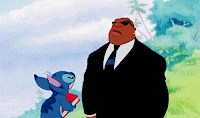And sometimes, people just throw on an ending because they can’t think of anything else.
The ending can make or break my story. It’s the rich, perfectly sweet dessert after a feast of savory words. I can have the absolute best filet mignon in the world paired with an exquisite wine, but if we end the meal with a pie made from rotten apples… well, that’s the part we’re all going to remember. A so-so story with a really fun ending usually gets favorable reviews. A strong manuscript that spirals downward at the end, more often than not, doesn’t go anywhere except into that big pile on the left.
And some endings almost never work, no matter what the rest of the story is. Endings like…
One type of story that does this a lot is the “slice of life” tale. You know the one, just two or three average days in the life of two or three average people. It’s hard to say this kind of thing is wrong in a general sense. Most of our lives don’t change radically on any given day. I’ve spent most of today here at my desk writing, just like I did yesterday and probably like I’ll be doing tomorrow. So it’d be a realistic ending if a story about me ended with me back here working at my desk.
The Heroes Don’t Do Anything
 When I get to the end of my story, what’s my character actually doing? I mean, sure, pointing and shouting and worrying are all things you can do, but are they actually doing anything that’s directly affecting this outcome? Or is someone else doing it? And if it’s someone else… have we been following the wrong person?
When I get to the end of my story, what’s my character actually doing? I mean, sure, pointing and shouting and worrying are all things you can do, but are they actually doing anything that’s directly affecting this outcome? Or is someone else doing it? And if it’s someone else… have we been following the wrong person?
Everybody Dies and the Antagonist Wins
This is the ending that comes out of nowhere. The quarterback finally gets his act together, aces his exams, convinces the cute girl from drama club that he really loves her, gets voted prom king but turns it down… and then gets hit by a bus on the last day of school. Our heroine stops international terrorists working with alien invaders, but in the end her girlfriend accidentally drinks the tainted Soylent and is devoured by necrotic nanites anyway. Or, as I experienced many years back, a friggin’ hilarious ninety minute sketch comedy show ends with a bleak monologue about racial inequality and prejudice.
In my experience, the vast majority of writers who use this kind of ending are trying to achieve art. It’s me attempting to show how this story flawlessly mimics a random and sometimes meaningless real world by having a random and meaningless ending. It doesn’t relate to anything that happened because… it’s real. And tragic. And artistic.
This one’s a little odd. I use this phrase here a lot, and it’s kinda an homage to the movie I found it in–Speechless (written by Robert King). This ending gets its name from the old Lassie TV show. Little Timmy encounters some problems, works his way out of them with Lassie’s help, and at the end Mom sits him down and explains what happened and why. “Y’see, Timmy, sometimes people get hurt or scared and it just festers down inside of them…” Timmy and the audience learn a little something about life and we all go home as better people.
The problem is, in clumsy hands the Y’see Timmy quickly becomes “brutally beating the audience with my message.” That’s why it’s on this list. A great example is Ayn Rand’s Atlas Shrugged, where the 98 page monologue (no, seriously) at the end of the book recaps every single one of the subtle lessons that were shown in the first 800 pages, but all dialed up to eleven-point-six. And if you know what I’m talking about, I’m betting you probably ended up skimming and/or blotting out most of that monologue. Just like everyone else did. Except Paul Ryan.
Okay, I think three’s a sort of wish-fulfillment-validation thing, to be honest. Work with me here. My character writes a book about how she used to be a international assassin and it becomes a New York Times bestseller, right? So, logically, my book about someone writing a book about how she used to be an international assassin should alsobecome a New York Times bestseller. Right?
Probably the worst offender of all of these. All too often the amazing tale of adventure ends with one of my heroes waking up on the couch or in a hospital bed. None of the story my audience has just invested their time and attention in actually happened. Not even within the world of the story. We all just put ourselves into a story about a person who was putting themselves into a story. The end.
To Be Continued…
No, I lied. This is the worst offender. Hands down.
 We all want to write great, sprawling epics. Okay, maybe not all of us, but I’m sure a lot of folks here do. We want to write that massive series that spreads across at least six books and gets us an HBO deal. Starz at the least. But it just doesn’t happen this way.
We all want to write great, sprawling epics. Okay, maybe not all of us, but I’m sure a lot of folks here do. We want to write that massive series that spreads across at least six books and gets us an HBO deal. Starz at the least. But it just doesn’t happen this way.
There’s an ugly lie that races through writing groups and threads—the idea that publishers only want to buy series. First, that’s just not true. I know dozens and dozens of writers who’ve sold one-off books (myself included). Second… editors and publishers very rarely want a series. What they want is a book with series potential. A book that—if the preorders are good and word of mouth is great—I can easily write a sequel to. And another sequel. And maybe a fourth. Or even a fifth.
More to the point, as a beginning writer I need to convince agents and editors that I know what I’m doing. That I’m able to bring things to a satisfying close. So if my conclusion is “maybe I’ll end this in the next book”… well, that’s not going to score me points with anyone. Especially readers if that second book isn’t already a guaranteed thing.
Until then… go write.







